How Much Better Is A Digital Camera Than The Camera In My Phone?
Camera Phone vs Digital Photographic camera? This is a mutual question. Information technology's usually asked by people who don't own a digital camera.
In this article, I'll address the main differences in taking photos with your telephone and with a digital camera.
Convenience vs quality. This is the biggest divergence betwixt a camera telephone vs digital camera. Your phone is small, compact and always with you lot. I of the biggest benefits of a DSLR is the quality images it can produce.
In that location's no such thing every bit a DSLR camera that'southward every bit like shooting fish in a barrel to utilise as an iPhone camera. There's also no such thing every bit a DSLR quality camera phone.
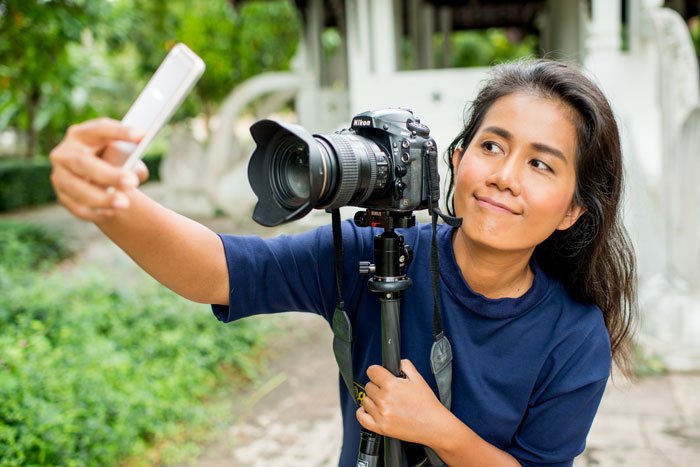
Photographic camera Phone vs Digital Camera Sensor Size
Smartphone camera sensor sizes are tiny compared to DSLR cameras and mirrorless cameras. This is one of the principal differences in camera telephone vs digital camera. Even the loftier-end betoken and shoot cameras have larger sensors. By size, I am not meaning pixel count, only the actual physical size of the sensor.
You lot might have a smartphone with a 48-megapixel sensor, simply it measures less than 5 mm, (0.2 inches) broad. This means your 48 million pixels are but 0.eight microns. Tiny. In a DSLR or mirrorless camera with a 48-megapixel sensor, the pixel size is much larger. A 'full-frame' sensor measures 36mm (1.41 inch) broad. Each pixel is bigger and more responsive to light.
More pixels does more often than not mean more than particular is captured. But often this becomes irrelevant. Well-nigh photos taken on iPhones end upwards on Facebook or Instagram. These platforms compress your photographs down to around 2 megapixels. So you're throwing away 46 megapixels worth of data.
Capturing more than detail with more than pixels means you can impress your photos bigger. Yet, you will notice a loss of quality in one case you lot start manipulating smartphone photos. Imaging apps like Snapseed or Afterlight can dethrone your photo quality. This becomes much more evident once you enlarge your pictures beyond the size of your phone'south screen.
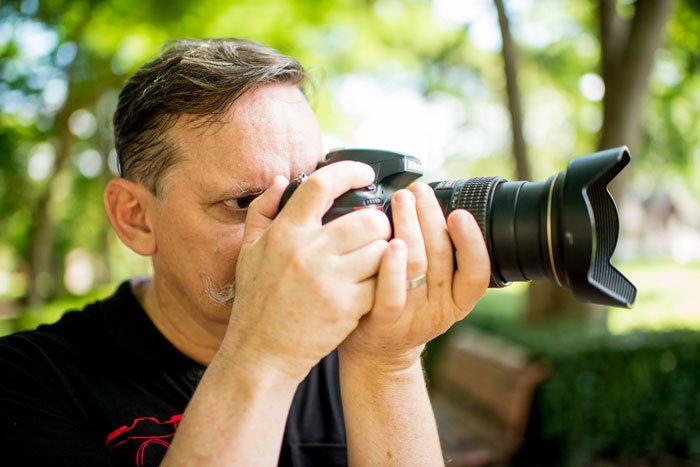
Smartphone Lenses Compared to Camera Lenses
The best smartphone lens is no match for any reputable DSLR or mirrorless photographic camera lens. Again, size makes the difference.
Mobile telephone lenses, like their sensors, are tiny. They are as pocket-size as 4mm wide and 0.2mm thick. This inhibits their power to produce high-quality photographs. Convenience is once again in their size. It's much easier to pack your telephone than it is your DSLR with a large zoom lens fastened.
Smartphone lenses are typically made of molded plastic, not glass. Many lens manufacturers famous for their glass have partnered with smartphone companies. They produce pressed plastic lenses, non glass ones. These are often manufactured by third parties to limit costs. They are cheap and no real comparison to any quality camera lens.
Along with the sensor, the lens makes the biggest impact on image quality. This is some other major consideration in thinking about camera telephone vs digital camera. The improve your lens, the higher quality photographs are possible.
The benefits of DSLR and mirrorless camera lenses is their quality. You tin also zoom or change them for a different focal length.
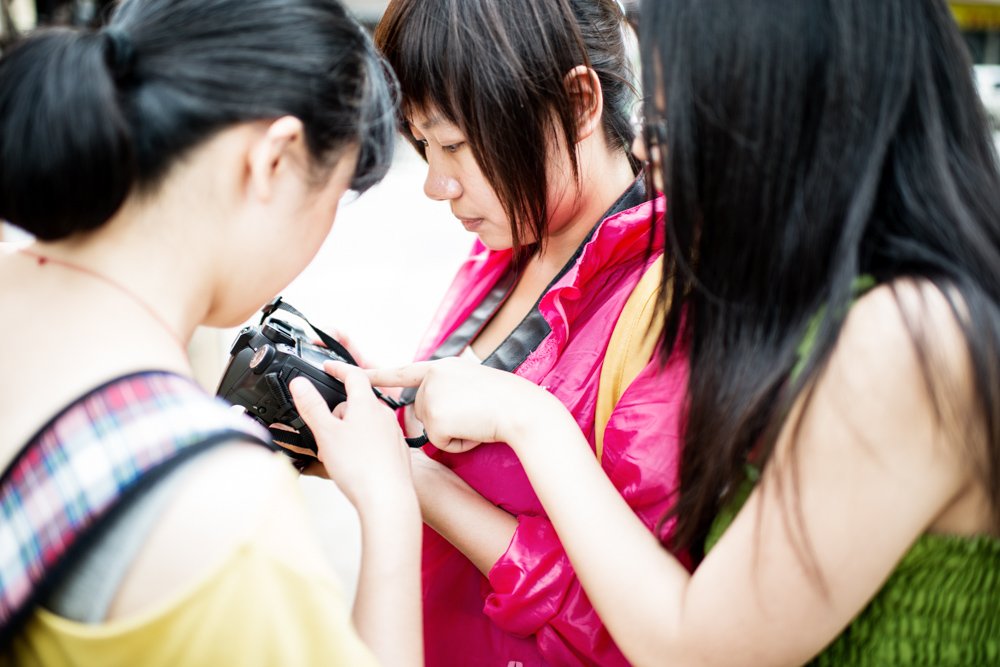
Camera lenses all incorporate controls for:
- sharpness,
- baloney,
- vignetting
- chromatic abnormality
In smartphones, these issues are oftentimes dealt with digitally. This does non provide the same quality image.
Using an optical zoom, or changing your camera lens makes them more flexible than a telephone camera. Virtually phones have broad angle lenses. These are great if you are close to what you're photographing, just do non have the accomplish of a good optical zoom. Using the digital zoom on your phone is not worth it. The image quality is drastically reduced when you do.
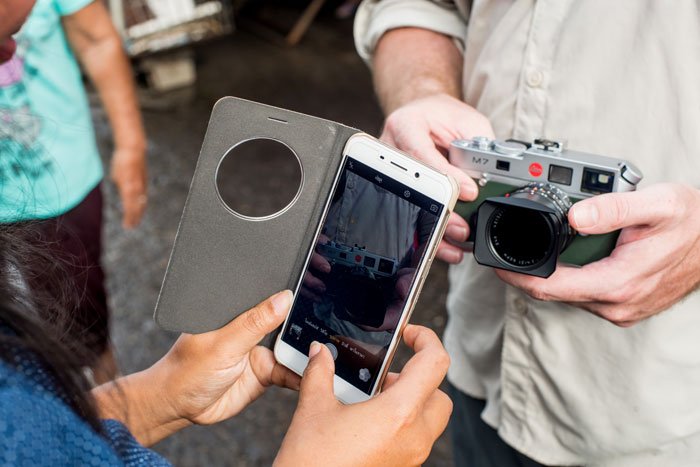
Smartphone vs DSLR Image Processing
Smartphone photographic camera sensor size is a large disadvantage when information technology comes to quality. An iPhone camera vs DSLR for real depth of quality is no existent comparison. Backend software manipulation makes smartphone photographic camera pictures look so good. As this technology advances in phones, it too advances in digital cameras.
Phones are packed with image processing algorithms to compensate for the tiny sensors and lenses. This software manipulates your photos to brand them expect how the software decides is best. Often this produces expert results, merely sometimes it doesn't.
When lighting conditions are poor smartphone cameras oft produce poor results. Confined to viewing on your telephone's monitor they may look okay. But once yous enlarge them the flaws become evident.
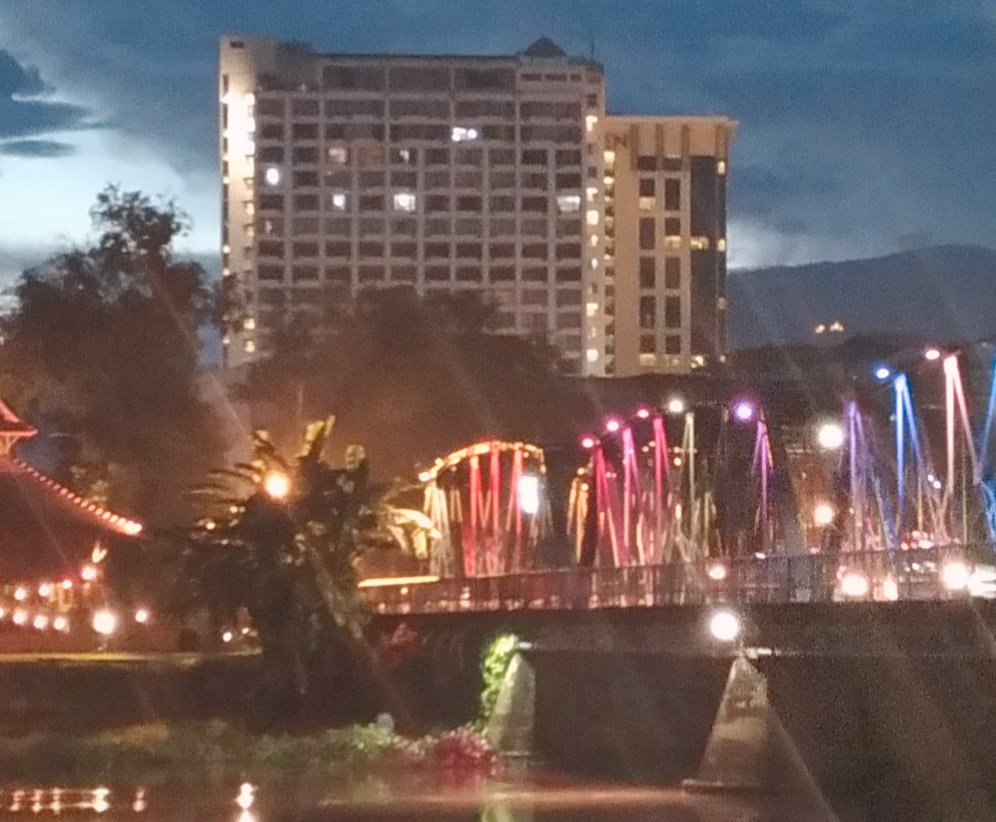
This image was taken at dusk soon after the street lights came on. Information technology is an example of how my phone has not managed to render the detail well. On my phone screen it looked okay, but here, enlarged to 100%, you lot tin can see that information technology'south not abrupt. The details are lost.
Digital noise is likewise a large problem in this photo. This happens because the small sensor is not able to manage the low light. The software on the camera has not been able to successfully render the photo well.
External App Problems with Smartphone Photographs
Even when the light is good and you lot use filters on smartphone photos, the quality is adversely affected. Small amounts of filtering don't often damage the paradigm quality, simply you need to take care non to button the extremes.

In this phone photograph of the view from our domicile, I added some filtering using the popular Snapseed app. There was plenty of light when I took the photo so the quality was good. Once I applied the filtering the paradigm quality broke downwardly.
When the Light is Poor or Challenging
Equally I illustrated with the photo to a higher place taken at dusk, smartphones don't manage low light situations well. This was as well a problem with the earlier DSLR cameras. As sensor sizes and quality have improved, cameras have become more capable of producing photographs in very low light.
Light is the essence of photography. With no calorie-free, yous cannot take a photograph. The lower the low-cal, the more hard information technology is for digital cameras to produce loftier-quality results. Fifty-fifty our eyes do not see so well when the light is low.

Larger sensor sizes, ameliorate quality high ISO options, and improved software have helped overcome these problems.
Backlighting is one of the virtually challenging lighting conditions. A greater corporeality of light backside your bailiwick will oftentimes fool your exposure meter. Your subject field tin end up looking also dark.
Adjustments for exposure can be made with both digital cameras and smartphones. This is much easier on a adept quality DSLR or mirrorless camera. You need to override the automatic metering role and gear up your exposure manually. You tin can also use exposure compensation if your camera is set to one of its motorcar exposure modes.
Using your smartphone or iPhone to compensate for potent backlighting is possible. But often means a loss of epitome quality. To do this on most phones you simply press and hold on the point where you desire to focus. A slider appears which you can use to alter the exposure so information technology looks the way y'all want it to.
Controlling your phone's exposure in this mode may mean the ISO or shutter speed is changed. A higher ISO volition mean more digital noise and a loss of quality. A boring shutter speed can result in blurring if you don't hold your phone completely notwithstanding when taking the photograph.
When the light is depression or challenging digital cameras manage the conditions better. This is considering of their larger sensors and higher quality lenses.

Making That Overnice Soft Background
DSLR and mirrorless cameras can brand photos with soft backgrounds far more effectively than iPhones tin. The reasons for this come right back to sensor size and lens quality.
Cameras and smartphones with minor sensors cannot create photos with nicely blurred backgrounds. At least non the same way cameras with larger sensors can. Size matters.
Smartphone cameras must employ a combination of lenses and/or software manipulation to blur backgrounds. Take a look at this article to find out how Google's unmarried lens Pixel camera produces this event. Results I have seen from the latest iPhones accept been unimpressive. This technology needs a lot more than development.
Cameras with larger sensors can make this type of photo with a unmarried lens and no software.
The other main advantage cameras accept over smartphones in this area is the quality of the lenses. Camera lenses are not and so restricted every bit iPhone lenses. The wider the lens, either on a telephone or a camera, the more difficult information technology is to attain a good blurred background. Also, the wider the maximum aperture is on the lens the easier it is to accomplish this soft look.
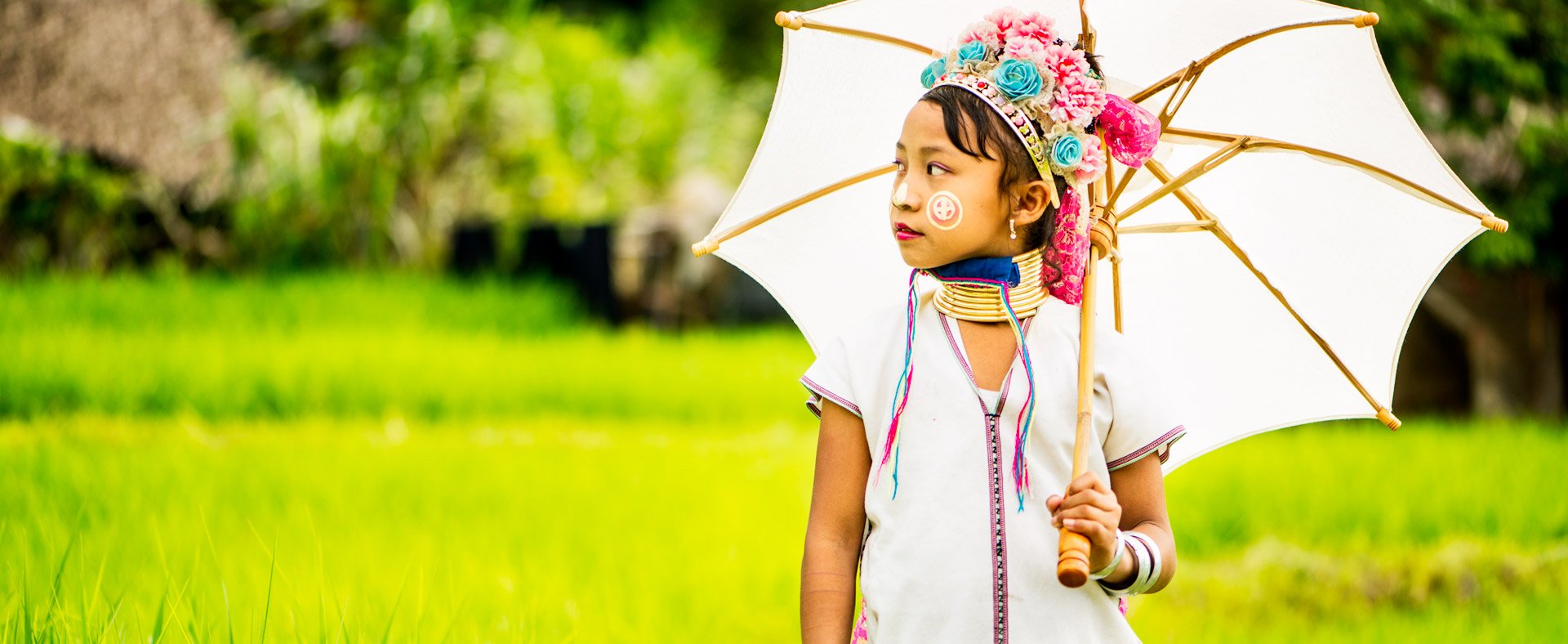
Should I Become A Photographic camera?
If y'all're thinkin about photographic camera phone vs digital photographic camera consider both technologies are advancing at terrific rates. As iPhones become better, and then do Nikons, Canons, Sonys and every other blazon of camera. If you are serious about enjoying photography you should buy a camera.
More than people than ever in history are taking photographs. Nigh are content to use the camera on their phone because information technology'southward convenient and like shooting fish in a barrel to manage. Some are realizing how limiting phone cameras are. They are discovering the joy and the difficulties of using a real camera.
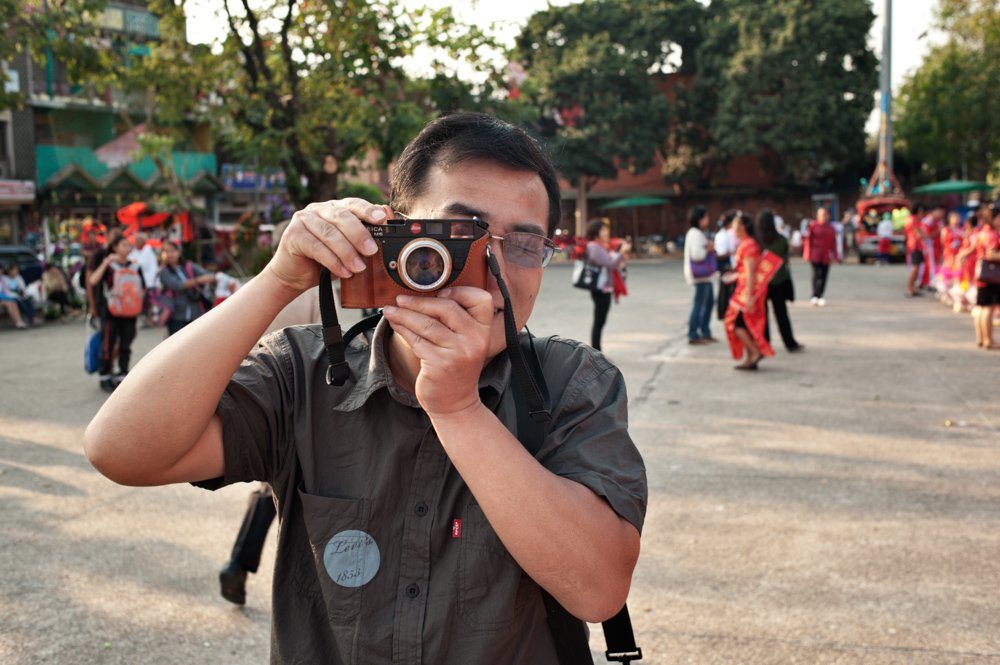
Cameras on phones are fabricated to take snapshots. The master reason they are used more than DSLR or mirrorless cameras is because they are convenient. Even though photographic camera engineering science in phones has advanced they are not capable of the quality and creativity you tin master with a existent camera.
It requires an investment of fourth dimension and money to use a photographic camera, but the results you tin achieve are well worth it. I'm not suggesting y'all finish taking photos with your telephone. Cameras and phones compliment each other.
The convenience of a phone ways it'southward worth learning to have good photos with it. The quality of the image produced by a camera means you will feel much more satisfaction when you commit to learning to utilize information technology well.
There'southward no point in buying a decent photographic camera and not learning to utilize it properly. Many people will glance at their manual after purchasing a camera and leave information technology at that. A short while afterward the camera is sitting in its handbag unused. Getting a feel for your new camera takes time and effort and is almost enjoyable. But you must make the time and as well acquire how your camera works earlier you can start taking great photos with it.
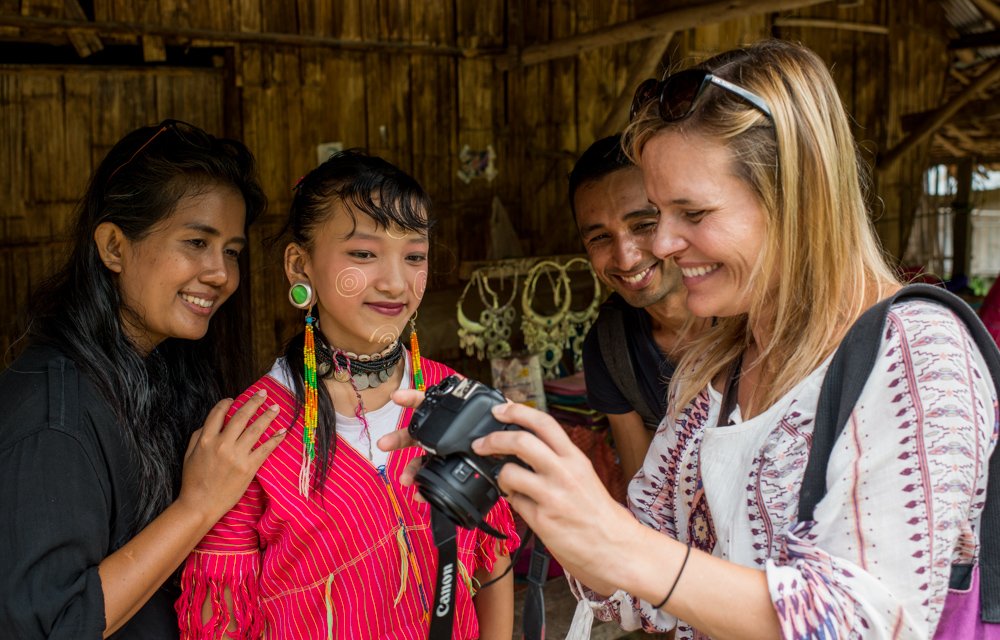
How To Transition from Using Your Telephone to Using a Camera
Information technology takes time, study and practice. Check out this video to learn more than and bank check out this pace by footstep guide on how to brand the transition from taking photos with your photo to using your camera finer.
Source: https://www.kevinlj.com/camera-phone-vs-digital-camera-what-is-the-difference/
Posted by: petreecoulth56.blogspot.com

0 Response to "How Much Better Is A Digital Camera Than The Camera In My Phone?"
Post a Comment